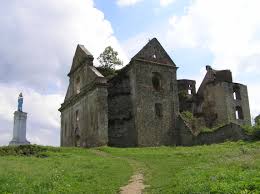ruin
英 [ˈruː.ɪn]
美 [ˈruː.ɪn]
- n. 废墟;毁坏;灭亡
- vt. 毁灭;使破产
- vi. 破产;堕落;被毁灭
- n. (Ruin)人名;(德、意、芬)鲁因;(法)吕安
使用频率:

中文词源
ruin 破坏,毁坏
来自拉丁语 ruina,倒塌,毁坏,来自 ruere,倒塌,崩塌,来自 PIE*reue,击,打,撕开,词源 同 rag,rough.字母 g 脱落,比较 regulate,rule.
英语词源
- ruin
-
ruin: [14] If something is ruined, etymologically it has simply ‘fallen down’. The word’s ultimate ancestor is Latin ruere ‘fall, crumble’ (source also of English congruent). From it was derived the noun ruīna ‘fall’, which passed into English via Old French ruine.
=> congruent - ruin (n.)
- late 14c., "act of giving way and falling down," from Old French ruine "a collapse" (14c.), and directly from Latin ruina "a collapse, a rushing down, a tumbling down" (source also of Spanish ruina, Italian rovina), related to ruere "to rush, fall violently, collapse," from PIE *reue- (2) "to smash, knock down, tear out, dig up" (see rough (adj.)). Meaning "complete destruction of anything" is from 1670s. Ruins "remains of a decayed building or town" is from mid-15c.; the same sense was in the Latin plural noun.
- ruin (v.)
- 1580s (transitive), from ruin (n.). Intransitive sense "fall into ruin" is from c. 1600. Financial sense is attested from 1660. Related: Ruined; ruining.
权威例句
- 1. She wasn't going to let her plans go to ruin.
- 她不会让她的计划破产的。
- 2. "But we might ruin the stove." — "Who cares?"
- “可我们会把炉子弄坏的!”——“我才不在乎呢!”
- 3. We looked out upon a scene of desolation and ruin.
- 我们放眼望去,眼前是一片荒凉的废墟。
- 4. His enemies are determined to ruin him.
- 他的敌人决意要毁了他。
- 5. The vineyards were falling into ruin.
- 这些葡萄园日渐没落。
